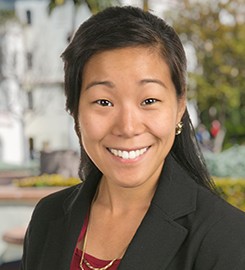Going Beyond Typical Engineering Education with Dr. Diana Chen
Engineering education has evolved over the years. Three decades ago, engineering students would solely be trained in the technical aspects that prepared them for their work, but not necessarily for the world. Recently, there has been a shift to go beyond this typical structure and involve a wider framework for how professors impart knowledge to their students.
Diana A. Chen, PhD, knows the importance of this framing.
“We're taught to think engineering is neutral and objective in school, but realistically, what type of engineering research is funded and what technology we create are all decisions made by people,” Dr. Chen said.
Dr. Chen is one of the founding faculty members of Integrated Engineering at the University of San Diego. She earned her BS in Engineering from Harvey Mudd College and earned her MS and PhD in Civil Engineering from Clemson University.
“In engineering, decisions are made by people. Engineers ultimately are still people, we each have our own flaws and biases, and that gets built into our technology and our products,” Dr. Chen said. “The idea behind a ‘sociotechnical’ engineering education is to build it into the curriculum to help students see before they graduate and go into the workforce, where they have to figure out on their own how their work impacts people in society.”
In the Fall Quarter, Dr. Chen visited the University of Denver’s Ritchie School of Computer Science and Engineering. She hosted a Lunch and Learn in November on the importance of incorporating Justice, Equity, Diversity, and Inclusion (JEDI) initiatives into curriculum to help better prepare students for the workforce.
“It is important to remember that engineering and technology are used by and for people, and if you leave out that aspect, you are only looking at part of the problem,” Dr. Breigh Roszelle, Associate Dean for Undergraduate Studies at the Ritchie School, said.
“Reframing engineering as sociotechnical is that first baby step of considering how technologies impact people. In the sign language gloves example I shared in my talk, have we considered the input of the people who will actually interact with the technology?” Dr. Chen said, referring to an article in The Atlantic that explored how these gloves are built to translate sign language for the listener. However, the gloves are difficult for the hearing-impaired person to wear and aren’t made for their ease, but for the ease of the hearing person.
“We can slowly start to think through who the people are that this is impacting, and how it impacts different groups of people differently. We have to think through the demographic piece of that and what the different intersectional identities are that come into play,” she explained.
Doing the work to incorporate JEDI initiatives is beneficial for both students and faculty because it will positively impact their education and influence their careers.
To help faculty approach this, Dr. Chen offered a Lunch and Learn presentation to discuss these topics at the Ritchie School. Faculty and students were invited to hear her speak on her experiences and endeavors to incorporate the socio-technical lens. She also held a workshop for faculty to help them learn how to approach this framework and incorporate it into their curriculum.
“Diana's talks have inspired me to look into my own course content and consider how I can add the socio-technical lens,” Dr. Roszelle said. “Technical content is very important, but the ability to link that technical content to people is also necessary.”
While Dr. Chen was only on campus for a short amount of time, the work she started should continue. Professors here are willing to commit to that work, and since change doesn’t happen overnight, Dr. Chen’s willing to continue to be a resource to faculty members
“We have to think through the demographic piece of that and what the different intersectional identities are that come into play,” Dr. Chen said. “It is tough to get there, and I encourage everyone to try. But the first step is to shift from equations and to solutions for people.”



